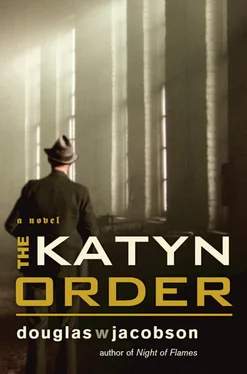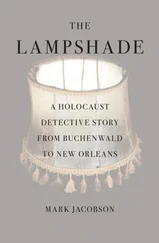Suddenly he felt a large hand on his shoulder and turned to see Piotr standing behind him. The big man motioned for Adam to follow, leading him away from the group of revelers, now all clapping in time to the beat of another song.
It was dark as Piotr and Adam crossed the square except for the warm glow of kerosene lanterns in the cabin windows. Adam’s heart pounded as they headed for a cabin just to the right of the church. Piotr had not said a word, and Adam knew better than to ask where they were going. He’d already figured it out.
Inside the log cabin was a large, high-peaked living area, lit by kerosene sconces on the walls and furnished with handmade wooden chairs and brightly colored, embroidered cushions. A boar’s head was mounted above the door. Casimir sat at a round oak table. Another man sat next to him with his hands folded on the table, a serious-looking man, whom Adam had noticed earlier. Casimir introduced him as Doctor Buchinski and motioned for Adam to take a seat.
“You’ve come looking for Ludwik Banach,” Casimir said quietly. Then he turned to the doctor.
Adam could barely breathe. He knew what was coming before the doctor opened his mouth. The words seemed unreal, disjointed, as though they were talking about someone other than his uncle. “He was quite ill… we did all we could… we kept him comfortable… but he grew weaker…”
Adam looked at the doctor; his vision blurred. “When…?”
“Just two weeks ago,” the doctor said. “He held on longer than I expected.” He stood up, placed a hand on Adam’s shoulder and left the cabin.
Adam sat in silence alongside Piotr and Casimir, with the same hollow feeling he’d had at Sachsenhausen when he first saw his uncle’s name in the Nazi ledger book. He’d always feared his uncle wouldn’t survive. But to get this close? To get within two weeks?
He looked at Casimir. “Did he leave anything with you… any papers… documents?” Adam had no idea what these men knew, what Banach might have told them.
Casimir shook his head. “No, there was nothing. Just the few clothes he brought with him.” The white-haired man got up and stepped over to a cupboard, returning with a bottle of vodka and three glasses.
Adam was grateful for the drink. He came to a decision as he set his empty glass on the table. “Ludwik Banach—the Provider—was my uncle.”
Surprise registered in the faces of the two Górale men, but they remained silent.
Adam continued. “Banach discovered something at the Copernicus Memorial Library before he left Krakow. It was a document. Did he say anything about that?”
“He said only that he had to get out of Krakow,” Casimir said, “and that the NKVD would be hunting for him. He stayed with Piotr and Krystyna at first, but we brought him up here as soon as we could, farther away from Nowy Targ. The Russians don’t come up here; it’s too difficult. They don’t know the area, the forests. He was safe here.”
“What is this thing he found, this document?” Piotr asked.
Adam studied the two men. The look in their eyes told him they could be trusted. But it was more than that. It was a look that said they were also AK, and they needed to know what he knew. He continued, “Ludwik Banach discovered a document proving that Stalin ordered the NKVD to secretly murder thousands of Polish officers in the Katyn Forest in 1940.”
Both men stared at him, their eyes wide with astonishment. After a moment, Casimir asked, “And they know? The NKVD knows about this document?”
“They know the document exists,” Adam said. “At least one of them does, an officer named Tarnov. He returned to Krakow from Berlin within the last few days. He tried to locate the same document months ago, back in January when the Russians first came into Krakow. But he couldn’t find it. Then, a month ago, I visited the Sachsenhausen concentration camp…”
The rest of the story spilled out. Adam talked rapidly, watching the growing concern in the other men’s eyes. When he finished, Casimir stood up and paced around the room. Then he placed both hands on the table. “Is it possible that Banach hid the document somewhere in Krakow before he came up here?”
Adam thought about what he’d read in Banach’s journal. There were a few days after the Germans left Krakow before the Russians moved in, a few days when his uncle was not under surveillance.
“Did he notify anyone before he left Krakow,” Casimir continued, “any type of message that—?”
A message!
Adam pushed his chair from the table and stood up, pacing around the tidy room as a thought formed in his mind. Suddenly it all became so clear, he wondered how he could have missed it. “Of course, that’s it!” he blurted out. The answer had been right there all along—in the last line of the journal.
“What is—” Casimir started to say, but Adam held up a hand and stopped him.
“He did leave a message,” Adam said, “a message I never quite figured out until just now. Pathetic pawns on the perilous chessboard of the NKVD!”
Casimir frowned. “I don’t understand.”
“It’s in the library. Stalin’s order authorizing the Katyn massacre is in the Copernicus Memorial Library!”
20 JUNE
ADAM LEFT PROCHOWA just after dawn on horseback. Piotr and Zygmunt followed behind in the wagon. The horse was a bay Carpathian pony, about 14 hands high, broad in the shoulders and sturdy, with an easy gait. Though Adam hadn’t ridden in several years, it gradually came back, and after a mile or two he was able to push the horse to a gallop across the meadows, then relax in the saddle as the sure-footed mare made her way down the rugged slopes.
Adam stopped every hour, alongside creeks or small ponds, allowing the horse to rest for a few minutes and graze on the mountain grass. Then he pressed on, his heart aching with grief, his eyes clouded with tears. Ludwik Banach was gone. He had died of tuberculosis in a remote mountain village. For years Adam thought him dead, but he had never really mourned him. And now… he had stood in front of the simple wooden cross that morning as the sun came up. And the grief had struck him like a hammer blow. He had recited a silent prayer but it wasn’t enough. He would make sure his uncle’s death was not in vain. And he would protect the journal. He had given it to Casimir before he left Prochowa, sure the AK leader would safeguard it.
As he pounded down the mountain, hunched forward in the saddle, Adam’s anxiety rose to a fever pitch with the stunning realization of where his uncle had hidden the order authorizing the Katyn massacre. And he’d left Natalia alone in Krakow… with Tarnov, and God only knew who else, hunting her down.
It was just past noon when Adam spotted the smoke. He slowed the horse to a walk, then guided it up a rocky knoll, a vantage point offering a long view down the mountain. At first there was just a puff, perhaps a kilometer away, darker than the wispy clouds in the background and dissipating quickly. He sat quietly in the saddle and watched, his eyes glued on the horizon. Another puff appeared, then a third, darker than before, lingering longer in the hazy, bluish-white sky. Finally a solid, unbroken plume of dark, black smoke rose above the treetops, drifting off with the breeze.
Adam cursed and jabbed his heels into the mare’s ribs. They bolted forward, down the back side of the knoll and back on the trail. He pushed the horse, ducking to avoid tree limbs, ignoring the risk, his mind a blur of fear and rage.
Ten minutes later he arrived at the clearing in the forest where he and Piotr and the two Górale neighbors had been cutting trees a few days earlier. Adam couldn’t see the cabins from here, but a plume of thick, black smoke rose above the treetops. He could smell the sharp, pungent odor and hear the crackling of burning wood.
Читать дальше












